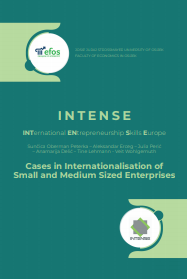FIYLO Deutschland GmbH
FIYLO Deutschland GmbH
Author(s): Raya Grigorova, Marcel Frank Ernesto Volz, Tine Lehmann
Subject(s): Business Economy / Management
Published by: Sveučilište Josipa Jurja Strossmayera u Osijeku, Ekonomski fakultet u Osijeku
Keywords: case study; SMEs; FIYLO; GmbH; Germany; internationalization; event planing;
Summary/Abstract: Whether you are walking through your hometown on a warm summer night, passing by bars and pubs, all offering entertaining events, comedy shows, or small concerts for uprising indie singers, or scrolling through Facebook or your favorite event’s page, looking for a cool new cafe to visit, festival to go to or concert to sign along with your friends and preferred artist, this is the daily life for most of us. However, have you ever wondered who organises all these events? How do they find a place and why was Ed Sheeran’s concert held in the Olympic Stadium, so far away from your home? Who makes those choices and how do they know where to go so that they gather the biggest crowd and make as much profit as possible? All these questions, and more, have been bothering a married couple of event planners for years, until one day, in the summer of 2006 they came up with an idea to gather all event venues under one roof, helping other agents organise events faster and smoother, providing you, the reader and customer, with more and exciting events to attend. Nicola and Frank make their, and many others’, dreams come true in 2007 in Hanover when they created a company called “locationportale”, later changed to “fiylo”, an abbreviation for “find your location”, and started helping event planners find the best location for their new events. The company has been operating in Germany, Austria, and Switzerland, but the question of internalization appeared in early 2018 when it thought: “Where to now?” It had 2 The Erasmus+ INTernational ENtrepreneurship Skills Europe (INTENSE) project started in September 2016 and it is aimed at achieving targets set out in the “Agenda for the modernization of Europe’s higher education systems” by improving the quality and relevance of higher education, by promoting mobility and cross-border cooperation, and by linking higher education, research and business sectors. The objective of the project was to develop and implement an innovative and complex teaching module on internationalization of SMEs, in order to boost entrepreneurial behavior and internationalization of students, HEI staff and SMEs. This leads to increasing employability of both HEI students and HEI university staff, and to a better understanding of the process of internationalization of SMEs by students and SMEs. The main project partners are five HEIs from five European countries: Hochschule für Technik und Wirtschaft Berlin, Germany, Turku University of Applied Sciences, Finland, Hogeschool Utrecht, the Netherlands, University Colleges Leuven-Limburg, Belgium and Josip Juraj Strossmayer of Osijek, Faculty of Economics in Osijek, Croatia. Innovation competences and versatile international skills can be boosted through education, but this requires consideration of qualitative and practical learning environments and utilization of active learning and new teaching methods. Teachers are key players in supporting students’ innovation-oriented action, which demands changing the traditional teacher-centred approach. International university-company cooperation as a learning environment enhances not only students’ but also teachers’ and SMEs’ innovation competences, entrepreneurial skills and knowledge about internationalization. International university-company cooperation can offer new innovative ideas and support for internationalization of SMEs’ business activities. Based on project activities, four groups of stakeholders (students, HEIs, SMEs and policy makers (ministries of education, science, economy, etc.)) are identified, and different recommendations for the development of the defined areas are made. At HEIs level, there is need for: financial support for similar projects connecting students, HEIs and the business sector, lifelong learning (LLL) programmes on internationalization for SMEs, joint (two or more HEIs together) master level programmes on business internationalization taught in English. Areas for improvement at the student level are: “learning by doing” type of programmes – working with real cases (companies), obligatory internships as an important part of study programmes, and combining other (e.g. language(s) course(s)) with these types of projects. The SMEs level requires creation of specific educational programmes on internationalization and a solution for financing parts of the internationalization process and matchmaking activities. The project also resulted in policy recommendations aimed at ministries of education and ministries of economy and entrepreneurship, and they include suggestions for an easier and faster process of changing curricula and support involvement of the business sector in curricula development (ministry of education); financial support for educational programmes on internationalization of SMEs and matchmaking activities (ministry of economy/entrepreneurship). 42 been surrounding itself with all neighbour countries as allies; so, the next logical move would be the Netherlands, Poland, or France. All around the world there are events and business trips organised, premiers and concerts held, but what strategy should it proceed with, should it expand to the Netherlands as a neighbour country, or is this path not leading it to global success?
Book: Cases in Internationalization of Small and Medium Sized Enterprises
- Page Range: 41-45
- Page Count: 5
- Publication Year: 2020
- Language: English
- Content File-PDF

